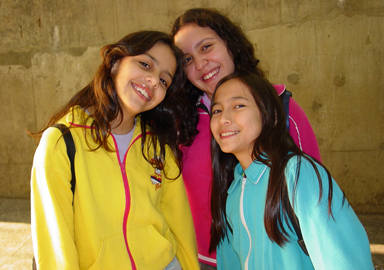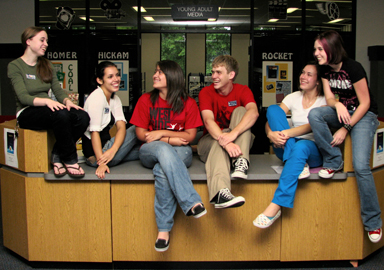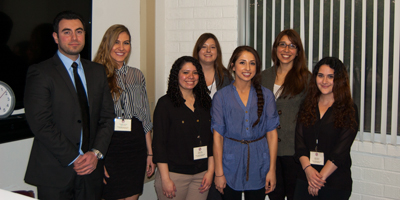PEERS
Program for the Education and Enrichment of Relational Skills
PEERS (Program for the Education and Enrichment of Relational Skills) is for teens interested in learning ways to make and keep friends and for parents who want to assist their teens in this goal. It is a comprehensive evidence based social skills intervention program which meets once a week for 12 weeks and is focused on helping teenagers develop an active and fulfilling social life. The program consists of structured activities, homework assignments and a simultaneous parent-education program to assist teens in putting newly learned skills into practice. Parents and teens meet separately, but simultaneously for 90 minutes each week. During each session, teens are taught very specific social skills and are given the opportunity to practice and apply those skills. Coaches (graduate students) give constructive feedback to the teens to improve social skill levels. Parents discuss how these skills can be implemented in their teen’s social situation. Parents are taught how to take on the role of supportive coach for their teen by learning how to give feedback. Parents assist their teen in successfully completing the homework assignments and support them in implementing their skills in a variety of new social settings.
Teens will learn how to handle issues such as:
- Choosing and keeping appropriate friends
- Trading information and finding common interests
- Slipping in and out of conversations
- Using humor appropriately
- Planning get-togethers and being a good host
- Being a good sport
- Coping with teasing, bullying, gossip, and rejection
- Handling arguments and disagreements
- Changing a bad reputation
Why is it Important to Take Action?
As children move into adolescence, social activities that have focused on structured play (e.g. playing with dolls, action figures, or Legos), hobbies (e.g. collecting and trading Pokemon cards) or organized activities (e.g. dance lessons or sports) give way to unstructured conversation and hanging out. At this stage of development, the amount of nonsocial activity decreases and social interactions become more complex. Adolescents become more keenly aware of any difficulties they have interacting with their peers and fitting in becomes a matter of paramount importance. Teens with poor social skills may find themselves isolated and susceptible to being teased and bullied. They also miss out on activities which will increase their competence in social situations.
Research indicates that peer relationships increase independence and are positively correlated with high self-esteem and academic achievement and negatively correlated with loneliness, conduct problems, depression, and anxiety. Having just one or two best friends can make a significant difference in determining the quality of a child’s adolescence and on his/her future adjustment in adulthood. Friendships can buffer the impact of stressful events and are a gateway to numerous age related experiences that foster identity formation.
Who is PEERS for?
Peers may be appropriate for teens with:
- Asperger’s disorder
- ADHD
- Social anxiety/Social phobia
- Depression
- Other social and behavioral problems
This program is for teens with a wide variety of needs, including those who may fall on the Autism spectrum, have ADHD, anxiety, depression, or other developmental and socio-emotional problems.
How to Apply to the Program
Participation Requirements:
At California State University Northridge, the PEERS program involves separate but simultaneous sessions for parents and teens. Parents are able to discuss the lesson plan with other parents while teens meet separately to learn and practice their social skills with other teens. Sessions will be held on the CSUN campus located at 18111 Nordhoff St., Northridge, CA 91330-8311 from 4:00 pm to 5:30 pm. The class is held in Monterey Hall (2nd Floor), in the Psychology Clinic. This is the brick building on the corner of Zelzah and Nordhoff (you will see the CSUN letter sign located in front of the parking lot on Nordhoff). Please enter campus from Zelzah and Dearborn and park in Parking Lot G3. At least one parent/guardian MUST accompany teens to every session as PEERS is a parent-assisted intervention. Our semester long program consists of 12 weekly sessions. If you anticipate missing three or more meetings per semester you should consider joining at a later time as the program is designed to build upon the skills learned from the previous session.
Application Process (e.g. Intake Interview, Assessments):
Parents must speak with a PEERS representative before attending as space is limited. In order to participate in the program you must have a space reserved by either the Clinical Director, Dr. Dee Shepherd-Look, or the PEERS Student Director, Patricia Escobedo. To start the enrollment process we conduct a brief interview over the phone to share information about our program and to ask the parent questions about their teen to ensure that PEERS will benefit both the teen and parent. We want to make sure this will be a positive experience for each family. The next step is setting up a one hour interview with both the parent and teen on the CSUN campus. After the interview each family will be contacted by a PEERS group leader who will inform them about their application status. If you are interested in joining the PEERS program at CSUN, please call Dr. Dee Shepherd-Look at (818) 677-3429 or email dshepherd-look@csun.edu for more information.
Dates Available for Newcomers:
Our Spring 2014 session started on February 23, 2014 and all available spaces for teens and parents have been filled. Group sessions are held during the CSUN academic year (during spring and fall semesters only) as sessions are led by clinical psychology graduate students under the supervision of the Clinical Director. The next available session would tentatively start around early to mid September 2014.
Cost of the Program:
Currently the PEERS program comes at NO COST to participating families. This may vary per semester or academic year; please ask about program pricing when calling.
Schedule - Spring 2014
| Session | Date | Topic | Objective |
|---|---|---|---|
| 1 | 2/12/14 | Introduction and Conversational Skills I - Trading Information | Each week in PEERS the focus will be on a different social skill. To start, teens learn how to effectively trade information with others and how to keep a conversation going. |
| 2 | 2/19/14 | Conversational Skills II – Two Way Conversations | Teens learn how to share a conversation by having a two-way conversation and discussing common topics of conversation. |
| 3 | 2/26/14 | Conversational Skills III – Electronic Communication | Help teens learn appropriate uses of electronic communication with peers. |
| 4 | 3/5/14 | Choosing Appropriate Friends | Teens identify which activities or clubs they would like to join at school or in their community so they can find friends with common interests. |
| 5 | 3/12/14 | Appropriate Use of Humor | Teens learn how to pay attention to humor feedback and learn how use humor appropriately with peers and others. |
| 6 | 3/19/14 | Peer Entry I – Entering a Conversation | The focus is now on practicing skills necessary for developing new friendships. Teens practice how to slip into peer conversations. |
| 7 | 3/26/14 | Peer Entry II – Exiting a Conversation | Teens practice how to slip out of peer conversations. |
| 8 | 4/2/14 | Hosting a Get-Together & Good Sportsmanship | Teens learn how to organize and implement a get-together with potential friends and practice good sportsmanship. |
| 9 | 4/9/14 | Rejection I – Teasing and Embarrassing Feedback | Present new strategies for handling teasing. |
| 10 | 4/16/14 | Rejection II – Bullying and Bad Reputations | Present new strategies for handling bullying. |
| 11 | 4/23/14 | Handling Disagreements & Rumors and Gossip | Teens practice how to effectively resolve disagreements with peers and how to handle rumors and gossip. |
| 12 | 4/30/14 | PEERS Graduation | Graduation celebration and awards! |
Please download our brochure in PDF format.



